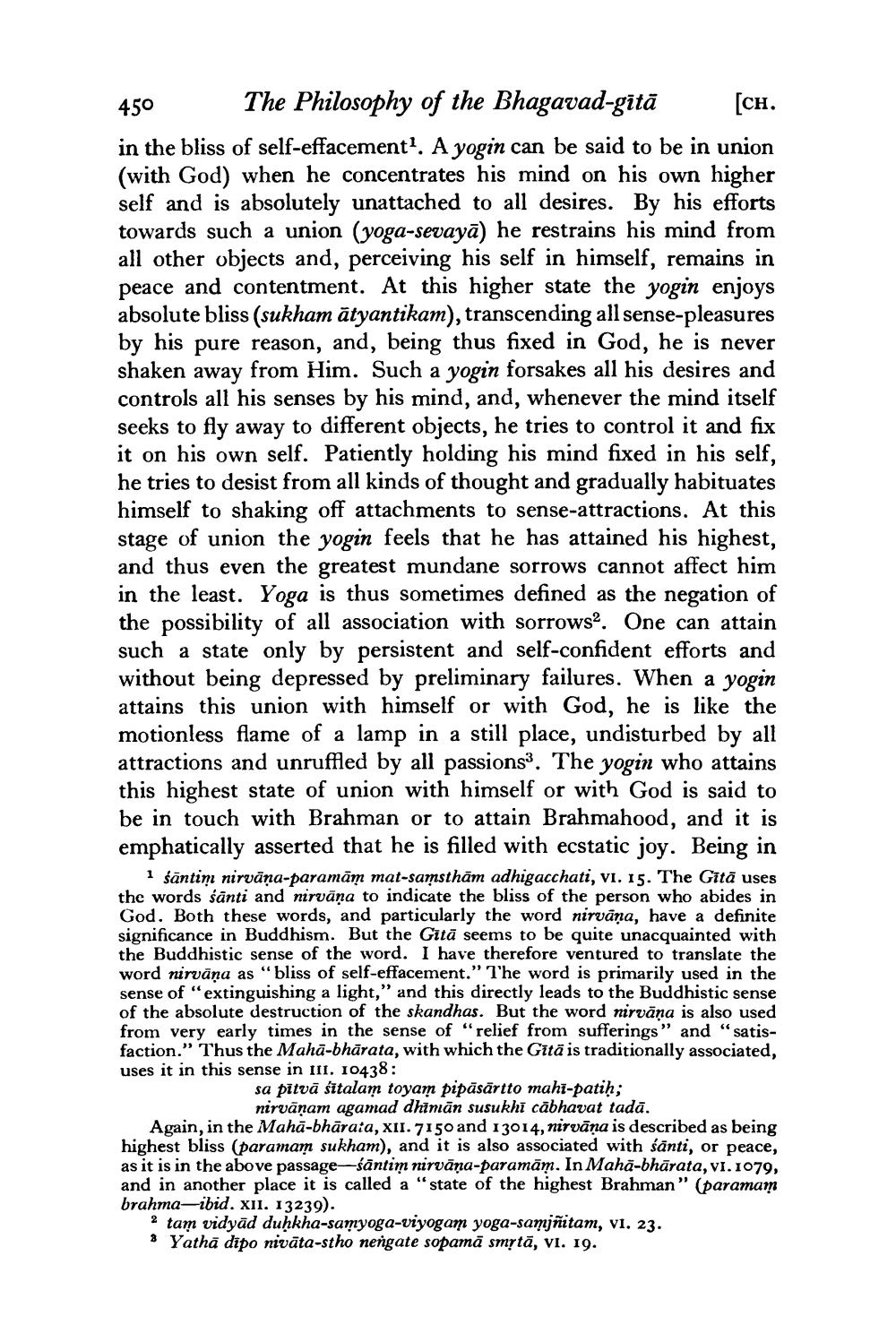________________
450
The Philosophy of the Bhagavad-gītā
[CH.
in the bliss of self-effacement1. A yogin can be said to be in union (with God) when he concentrates his mind on his own higher self and is absolutely unattached to all desires. By his efforts towards such a union (yoga-sevaya) he restrains his mind from all other objects and, perceiving his self in himself, remains in peace and contentment. At this higher state the yogin enjoys absolute bliss (sukham ātyantikam), transcending all sense-pleasures by his pure reason, and, being thus fixed in God, he is never shaken away from Him. Such a yogin forsakes all his desires and controls all his senses by his mind, and, whenever the mind itself seeks to fly away to different objects, he tries to control it and fix it on his own self. Patiently holding his mind fixed in his self, he tries to desist from all kinds of thought and gradually habituates himself to shaking off attachments to sense-attractions. At this stage of union the yogin feels that he has attained his highest, and thus even the greatest mundane sorrows cannot affect him in the least. Yoga is thus sometimes defined as the negation of the possibility of all association with sorrows2. One can attain such a state only by persistent and self-confident efforts and without being depressed by preliminary failures. When a yogin attains this union with himself or with God, he is like the motionless flame of a lamp in a still place, undisturbed by all attractions and unruffled by all passions3. The yogin who attains this highest state of union with himself or with God is said to be in touch with Brahman or to attain Brahmahood, and it is emphatically asserted that he is filled with ecstatic joy. Being in
1 santim nirvāṇa-paramām mat-samsthām adhigacchati, VI. 15. The Gitā uses the words santi and nirvāņa to indicate the bliss of the person who abides in God. Both these words, and particularly the word nirvana, have a definite significance in Buddhism. But the Gita seems to be quite unacquainted with the Buddhistic sense of the word. I have therefore ventured to translate the word nirvāņa as "bliss of self-effacement." The word is primarily used in the sense of "extinguishing a light," and this directly leads to the Buddhistic sense of the absolute destruction of the skandhas. But the word nirvana is also used from very early times in the sense of "relief from sufferings" and "satisfaction." Thus the Maha-bharata, with which the Gitä is traditionally associated, uses it in this sense in III. 10438:
sa pitvā sitalam toyam pipāsārtto mahi-patiḥ; nirvāṇam agamad dhiman susukhi cabhavat tadā.
Again, in the Maha-bhārata, XII. 7150 and 13014, nirvāņa is described as being highest bliss (paramam sukham), and it is also associated with santi, or peace, as it is in the above passage-santim nirvāṇa-paramām. In Mahā-bhārata, vi. 1079, and in another place it is called a "state of the highest Brahman" (paramam brahma-ibid. XII. 13239).
2 tam vidyad duḥkha-samyoga-viyogam yoga-samjñitam, v1. 23. 3 Yatha dipo nivāta-stho nengate sopamā smṛtā, VI. 19.




